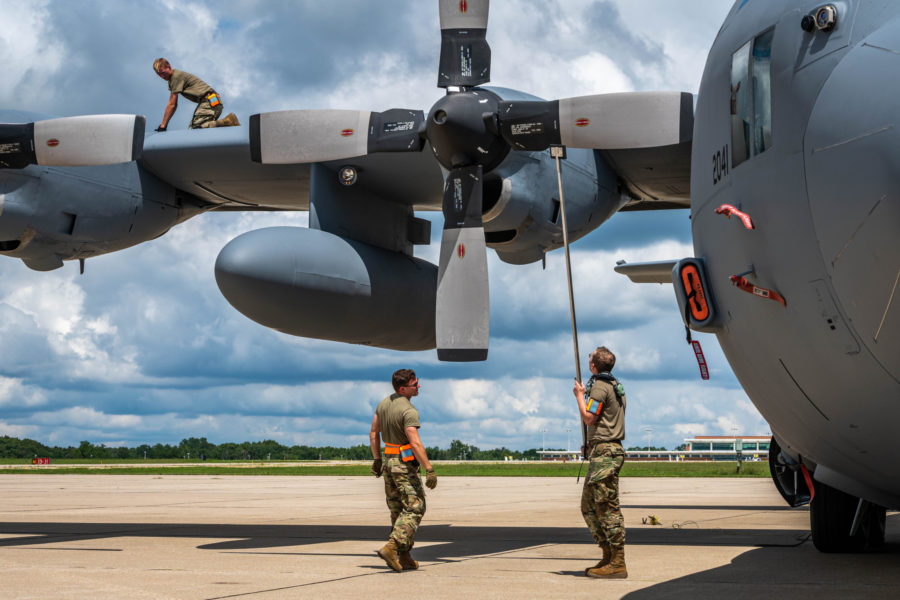Air Force maintainers examining the propellers on C-130H planes used electric arc etching pens to inscribe serial numbers once inspections were complete—and in doing so, likely caused the damage that has forced a grounding of the fleet.
That’s the conclusion Air Mobility Command has reached a month after it first ordered a safety stand-down of more than 100 C-130Hs with older propellers due to cracks in the propeller barrel assemblies.
“The process used to engrave serial numbers on the propellers caused the cracking that is being found on the C-130Hs. That process … involved an electric arc pen to incise digits into the surface of the metal,” AMC spokesperson Maj. Beau Downey told Air & Space Forces Magazine in a statement.
The practice of engraving the serial number on propeller parts is “standard,” Downey added, but the process for doing so isn’t always the same—sometimes maintainers use what he called an “acid wash,” chemically etching the number onto the part. AMC Airmen first began using the electric arc etching pen process more than a decade ago and continued to do so up until six months ago.
At that point, the method was discontinued, though Downey said the cracked propeller parts were not discovered at that time and AMC had not made a connection between the electric etching pen and cracked parts.
“Further analysis will be needed for a full understanding of the root cause of the cracks,” Downey added. “Right now our focus is on safely and quickly returning these aircraft to supporting the mission.”
When the safety stand-down was first announced Oct. 3, Downey said up to 116 C-130Hs could be affected, all with older 54H60 propellers dating back as far as the 1970s. Air Combat Command and Air Force Special Operations Command subsequently confirmed to Air & Space Forces Magazine that their respective variants of the C-130H, the MC-130H Combat Talon II, and EC-130H Compass Call, were being grounded as well.
A few weeks later, AMC said two C-130Hs had returned to flight. Now, however, the command is declining to say how many planes are still grounded, citing operational concerns.
Moving forward, though, the Air Force is working on a “multi-faceted recovery plan to resume safe aircraft operations as soon as possible,” Downey said, noting that it will be an “incremental process.”
Much of that process will unfold at the Warner Robins Air Logistics Complex, Ga., where maintenance crews are inspecting, repairing, overhauling, and testing affected propeller assemblies, Downey added.
The Air Force’s C-130H fleet is entirely in the Guard and Reserve—some 141 total as of Sept. 30, 2021, according to the latest inventory numbers. Of those aircraft, only those with four-bladed 54H60 propellers are grounded. Others had already been upgraded to eight-bladed NP2000 propellers prior to the grounding, while the C-130J has six-bladed R391 propellers—neither types are affected by the grounding.
As of 2021, the Air Force had ordered upgraded NP2000 propellers for 83 of its C-130Hs, according to a Collins Aerospace release. Now, the service is considering accelerating the production and installation of those propellers to replace the damaged ones, Downey previously told Air & Space Forces Magazine.
